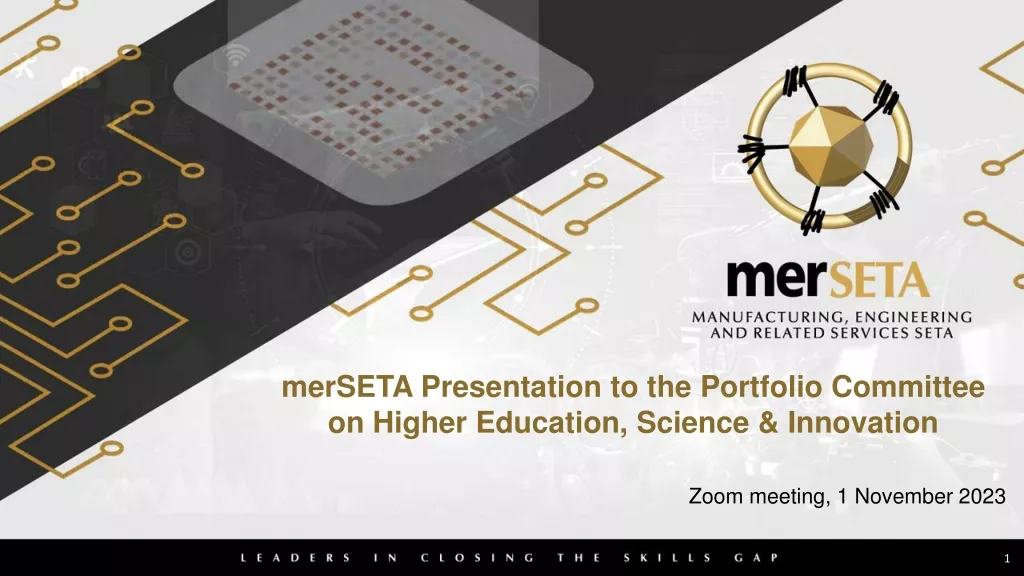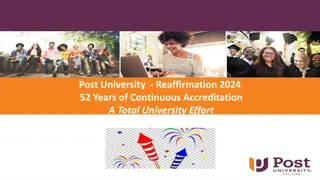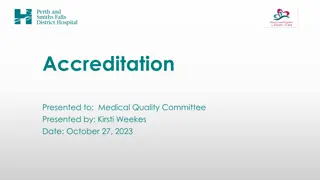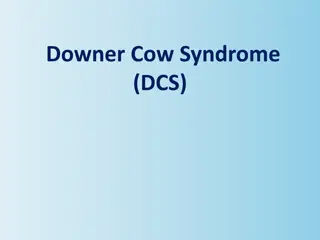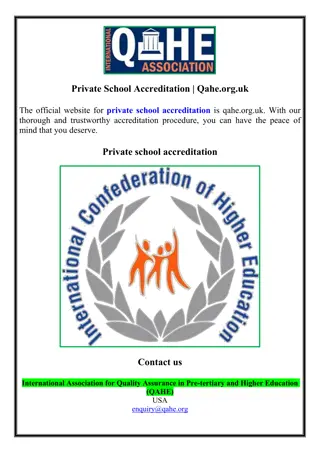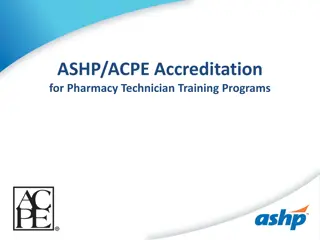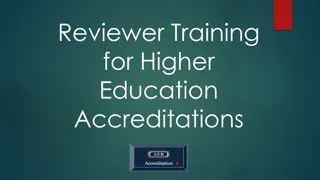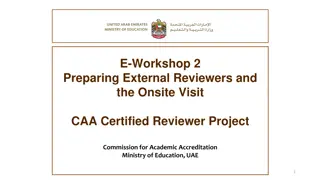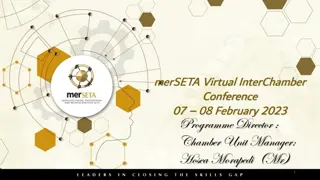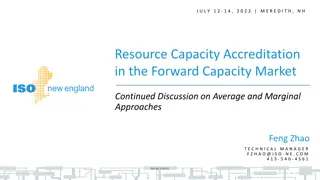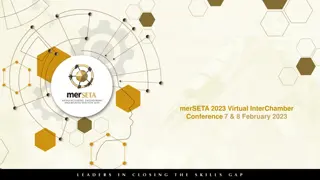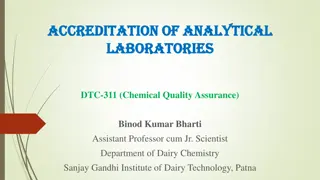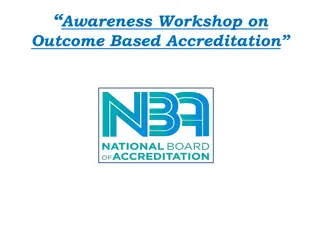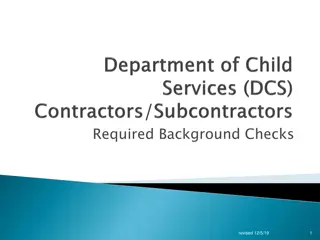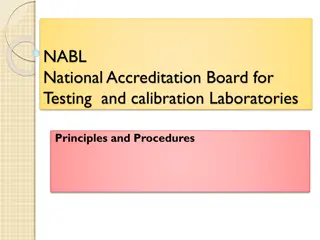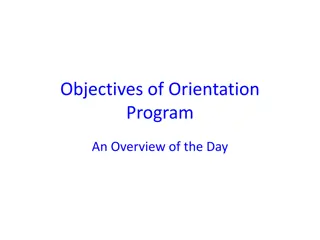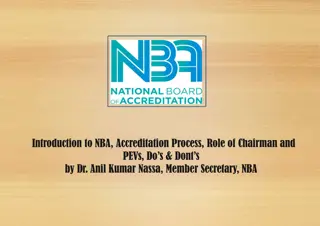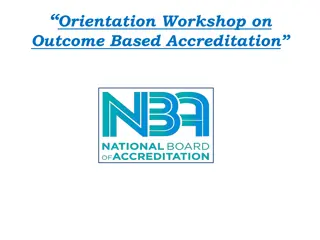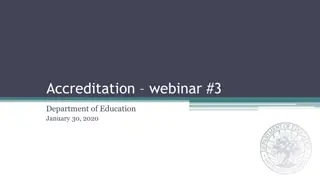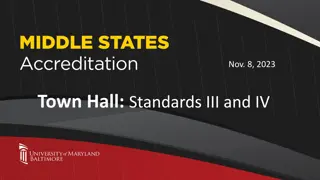
Skills Development Accreditation in South Africa
This presentation by Naphtaly Mokgotsane provides detailed insights into the accreditation requirements and processes in South Africa, particularly focusing on the merSETA, Quality Council for Trades and Occupations, and skills development provider accreditation. It covers the background of SETAs, quality assurance functions, types of learning programs, and SDP accreditation requirements, shedding light on the complex ecosystem of skills development in the country.
Download Presentation

Please find below an Image/Link to download the presentation.
The content on the website is provided AS IS for your information and personal use only. It may not be sold, licensed, or shared on other websites without obtaining consent from the author. If you encounter any issues during the download, it is possible that the publisher has removed the file from their server.
You are allowed to download the files provided on this website for personal or commercial use, subject to the condition that they are used lawfully. All files are the property of their respective owners.
The content on the website is provided AS IS for your information and personal use only. It may not be sold, licensed, or shared on other websites without obtaining consent from the author.
E N D
Presentation Transcript
DCS Accreditation Requirements & Process Presentation by Naphtaly Mokgotsane Snr Manager: Quality Assurance & Partnerships 25 November 2020
Overview Background Quality assurance functions Types learning programme Skills development provider accreditation Accreditation process Workplace learning quality assurance Quality assurance comparison
Background The merSETA is one of the 21 Sector Education and Training Authorities (SETAs) established to promote skills development in terms of the Skills Development Act of 1998 (as amended). The 21 SETAs broadly reflect different sectors of the South African economy. The merSETA encompasses Manufacturing, Engineering and Related Services: The various industry sectors are covered by five chambers within the merSETA: Metals Chamber; Motor Chamber; Auto Chamber; Plastics Chamber; New Tyre Chamber; and Automotive Components Manufacturing Chamber.
Quality Assurance Functions The Quality Council for Trades and Occupations (QCTO) is a Quality Council established in 2010 in terms of the Skills Development Act Nr. 97 of 1998. Its role is to oversee the design, implementation, assessment and certification of occupational qualifications, including trades, on the Occupational Qualifications Sub-Framework (OQSF). The merSETA is delegated the following functions: - Quality Assurance Partner (QAP): quality assurance of historical qualifications (unit standard-based). - Assessment Quality Partner (AQP): quality assurance of selected occupational qualifications. - Development Quality Partner (DQP): development of occupational qualifications to replace historical qualifications.
Types of Learning Programmes Historical qualifications (unit standard-based) - replaced by occupational qualifications. - accredited QCTO through SETA evaluation. Skills programmes (unit standard-based) - cluster of unit standard-based registered with SETA. - accredited by SETA. Legacy trades: - apprenticeships training schedule modules. - accredited by QCTO through National Artisan Moderation Body (NAMB) Occupational certificates - modular based: theory, practical and work experience. - accredited by QCTO.
Skills Development Provider (SDP) Accreditation Requirements /1 Quality Management System: - policies, procedures, templates and forms. Learning programme development, delivery and evaluation: - courseware, training documentation. Financial, administration and physical resources: - availability of training and assessments resources. Staff selection, appraisal and development: - facilitators, assessors and moderators. Learner entry, guidance and support: - learner selection criteria and learner support systems.
Skills Development Provider (SDP) Accreditation Requirements /2 Management of off-site components (on-the-job): - workplace components of the standards. Assessment and moderation: - management of assessments, recognition of prior learning and moderation. Record keeping and reporting system: - administer learner information and registration. Appeal process: - management of appeal process.
Accreditation Application Process Full qualifications historical qualifications - complete letter of intent available on www.qcto.org.za - QCTO acknowledges and refers applicant to SETA. Skills programmes - identify and select skills programme - applies at merSETA, online application on http://nsdms.merSETA.org.za
Workplace Learning Quality Assurance Workplace approval is conducted by SETA against learning programmes. - occupational health and safety compliance. - suitability of workplace programmes. - availability of suitably qualified mentors. activities to the learning Learner to Mentor ratios applies. Applies http://nsdms.merSETA.org.za at merSETA, online application on
Quality Assurance Comparison /1 Description Learnerships (unit std-based) Occupational Qualification (modular- based) Composition Fundamental, core and electives Knowledge, Practical and Work experience Accreditation of SDP QCTO through delegation to SETA (Quality Assurance Partner) QCTO Training Skills Development Provider (SDP): all unit standards SDP: knowledge and practical modules Workplace learning Approved workplace: unit standard-defined and evidence collected into PoE Approved workplace: work experience modules signed in the logbook Assessment SDP quality assured by SETA QCTO accredited Assessment Centre quality assured by Assessment Quality Partner (AQP)
Quality Assurance Comparison /2 Description Learnerships (unit std- based) Occupational Qualification (modular-based) Assessment form Summative assessment External Integrated Summative Assessment (EISA) Learnerships registration SETA applied for DHET registration QCTO to submit application to DHET Learner registration SETA SETA: register learners on learnerships Reporting SETA to DHET SDP report enrolments to QCTO - This may include learners not registered on learnerships NLRD uploads SETA to SAQA QCTO to SAQA
Thank you Naphtaly Mokgotsane NMokgotsane@merseta.org.za Contact: 010 219 3416 merSETA Call Centre: 0861 637 738

